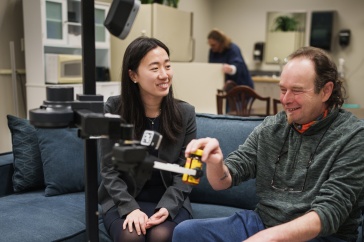Leading experts from UNH’s Institute for Health Policy and Practice are joining forces with several New England healthcare partners to offer a program that equips providers in some of the most rural areas with the education and support needed to help pregnant women with substance use disorders, as well as their newborns. As the opioid crisis becomes an increasing public health issue, this new telehealth program, called Project ECHO®, aims to provide valuable information to those who need it most.
Research has long pointed to substance abuse by mothers just before and after delivery as “both a challenge and an opportunity for improving maternal health and associated birth outcomes in New Hampshire,” said David Laflamme, research assistant professor at UNH and New Hampshire’s maternal and child health epidemiologist. “Recent data indicates that in the last three months of pregnancy more than 10 percent of women in N.H. smoke and 10 percent drink alcohol. This project offers a much-needed innovative and common-sense approach to support front line health care providers at the time and place where it will be most helpful.”
“This project offers a much-needed innovative and common-sense approach to support front line health care providers at the time and place where it will be most helpful.”
Through a telehealth format, participating healthcare providers from Aroostook County in Maine, northern and central New Hampshire, and southern Vermont will have access to behavioral health experts who will help identify clinical strategies, screening tools, resources and emerging topics in the fields of perinatal care and substance use disorders treatment. They will also share learning on challenging cases through case-based clinical teleconferences.
“We are excited to bring the Project ECHO® model to New Hampshire, and to have our first session focus on a topic of such concern to our state’s health care providers,” said Jeanne Ryer, director of the NH Citizens Health Initiative. “Unlike traditional telemedicine, where remote specialists assume the care of patients, this program lets experts teach and mentor clinicians, allowing them to care for patients in their community, while gaining more targeted knowledge and skills.”
“In a time when the opioid crisis seems to show no signs of slowing down, we’re proud to be part of an essential and innovative service that can help address behavioral health issues like substance use disorders in every corner of New Hampshire,” said Michael Ferrara, dean of the College of Health and Human Services at UNH. “This is just another step in UNH’s efforts to increase access to better healthcare through leading-edge programs.”
The model for the project was developed by Project ECHO®: Northern New England Network, a tri-state telehealth collaborative serving New Hampshire, Maine, and Vermont, which is a joint effort of the New Hampshire Citizens Health Initiative at the University of New Hampshire’s Institute for Health Policy and Practice, Maine Quality Counts, Vermont Program for Quality in Healthcare, Northeast Telehealth Resource Center, Maine Area Health Education Center, University of New England, New Hampshire Area Health Education Center, and the University of Vermont Office of Primary Care & Area Health Education Center. The project is supported by the Health Resources and Services Administration (HRSA) of the U.S. Department of Health and Human Services (HHS).
The NH Citizens Health Initiative is a multi-stakeholder collaborative effort that promotes health systems transformation in New Hampshire to improve the health of NH’s population, in line with the Triple Aim of better health, better care, and lower costs.
The Institute for Health Policy and Practice conducts and disseminates high-quality, cutting-edge applied research and policy work that enables health system partners to implement evidence-based strategies to improve population health.
-
Written By:
Robbin Ray ’82 | UNH Marketing | robbin.ray@unh.edu | 603-862-4864
















































